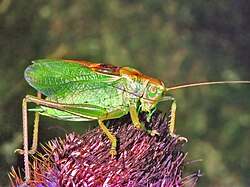Tettigonia cantans
| Tettigonia cantans | |
|---|---|
 |
|
| Tettigonia cantans, male | |
 |
|
| Female | |
| Scientific classification | |
| Kingdom: | Animalia |
| Phylum: | Arthropoda |
| Class: | Insecta |
| Order: | Orthoptera |
| Family: | Tettigoniidae |
| Genus: | Tettigonia |
| Species: | T. cantans |
| Binomial name | |
|
Tettigonia cantans (Fuessly, 1775) |
|
| Synonyms | |
|
|
Tettigonia cantans is a species of katydids belonging to the family Tettigoniidae subfamily Tettigoniinae.
This katydid is present in most of Europe, in eastern Palearctic ecozone, in Near East and in North Africa.
They can be encountered mainly in mountain habitats, in moist grasslands, shrubs and bushes, forest clearings, cultivated areas, sunny roadsides, etc.
The adult males grow up to 20–30 millimetres (0.79–1.18 in) long, while females reach 29–35 millimetres (1.1–1.4 in). The basic coloration of the body is usually green, with a brown stripe on the back. These grasshoppers hardly fly, their wings are shorter and wider than in the other Tettigonia species, only slightly covering the end of the abdomen. The ovipositor of the female extends beyond the tip of the wings.
Adults can be found from mid July through October. They mainly feed on other insects, but also on vegetable foods. They are active from noon till night and males are detectable by their characteristic and pleasant singing (hence the Latin name cantans). The females lay eggs in moist soil.
Tettigonia cantans, female
Tettigonia cantans, male
Tettigonia cantans, male nymph
...
Wikipedia
